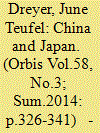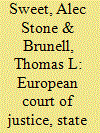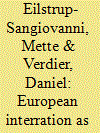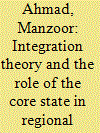| Srl | Item |
| 1 |
ID:
132552


|
|
|
|
|
| Publication |
2014.
|
| Summary/Abstract |
According to integration theory, growing economic interdependence between China and Japan should have spilled over into more cordial political relations. The opposite occurred, as summarized in the phrase "hot economics, cold politics." Even as both sides acknowledge the value of cooperation for shared benefit, commercial and strategic rivalries have intensified, calling into question the validity of integration theory.
|
|
|
|
|
|
|
|
|
|
|
|
|
|
|
|
| 2 |
ID:
185318


|
|
|
| 3 |
ID:
113549


|
|
|
|
|
| Publication |
2012.
|
| Summary/Abstract |
In an article previously published by the APSR, Carrubba, Gabel, and Hankla claim that the decision making of the European Court of Justice (ECJ) has been constrained-systematically-by the threat of override on the part of member state governments, acting collectively, and by the threat of noncompliance on the part of any single state. They also purport to have found strong evidence in favor of intergovernmentalist, but not neofunctionalist, integration theory. On the basis of analysis of the same data, we demonstrate that the threat of override is not credible and that the legal system is activated, rather than paralyzed, by noncompliance. Moreover, when member state governments did move to nullify the effects of controversial ECJ rulings, they failed to constrain the court, which continued down paths cleared by the prior rulings. Finally, in a head-to-head showdown between intergovernmentalism and neofunctionalism, the latter wins in a landslide.
|
|
|
|
|
|
|
|
|
|
|
|
|
|
|
|
| 4 |
ID:
061236


|
|
|
| 5 |
ID:
090655


|
|
|
|
|
| Publication |
2009.
|
| Summary/Abstract |
This article proposes a new interdisciplinary perspective in international relations (IR). It suggests that contributions from perception studies can help us reconceptualize some elements of IR. Specifically, the article takes up the concept of Gestalt and applies it to European integration. The Gestalt laws and phenomena demonstrated by European integration can be identified in other examples of regional integration, as well as in various international organizations, or alliances. They also provide insight into other features of IR, such as the international order. The Gestalt approach per se may contribute to the development of a psychological constructivist theory of IR.
|
|
|
|
|
|
|
|
|
|
|
|
|
|
|
|
| 6 |
ID:
123656


|
|
|
| 7 |
ID:
077429


|
|
|
|
|
| Publication |
2007.
|
| Summary/Abstract |
The European Union (EU) and the Common Market of the South (Mercosur) are very different regions that have come to seemingly analogous compromises as far as the operation of their common markets is concerned. Like the EU, Mercosur seems to confirm the textbook logic of integration development from a free trade area to a customs union and then to a common market. Does this mean that well-developed theories of European integration that emphasize certain properties of the European region are useless in explaining and predicting the Mercosur process? This article proposes a framework for comparison of the two blocs that uses selected theories of European integration: neofunctionalism, liberal inter-governmentalism, social constructivism and neo-realism. The framework is applied to the examination of intra-regional cohesion of the two interstate cooperative groups. Comparison of the two unions demonstrates that, despite similar institutional structures and partial set-ups of the common markets, they are qualitatively different processes that are highly conditioned by their unique regional properties. There is therefore no contradiction between Mercosur and the predictions of the Mercosur integration based on the theories of European integration. At the same time, Mercosur is strongly affected by the passive and active influence of the EU. However, the one-size-fits-all prescriptions for regionalism in the global south should be critically reevaluated. Mercosur and other regions have to optimize their development looking for solutions to specific regional problems rather than trying to adapt textbook models of integration derived from integration experience of the EU or NAFTA. The study emphasizes the importance of non-economic factors of integration and the necessity to evaluate the success of integration associations outside Europe in the context of local social realities rather than against the EU criteria
|
|
|
|
|
|
|
|
|
|
|
|
|
|
|
|